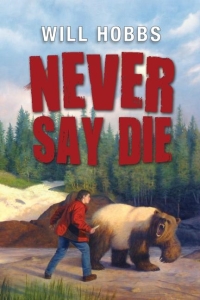Five questions for Will Hobbs
Since 1988 and the publication of Changes in Latitudes, Will Hobbs has been one of the preeminent adventure novelists writing for young people.
 Photo: Jean Hobbs
Photo: Jean HobbsSince 1988 and the publication of Changes in Latitudes, Will Hobbs has been one of the preeminent adventure novelists writing for young people. Typically, his stories feature a young protagonist confronting some challenge or other posed by the natural world; in his new book Never Say Die, a boy and his adult half-brother face all manner of danger in the remote reaches of the Yukon Territory.
1. You’ve been writing for young people for twenty-five years. How have your books changed over time?
WH: Over the years I find myself writing with more suspense, more dramatic tension. A novel is a big commitment for young people accustomed to clicking from one thing to the next. My goal is to provide kids a slam-dunk experience in the rewards of sustained reading.
2. I’ve never been camping in my life and find the prospect terrifying. When you’re alone in the wilderness in a tent at night, what are YOU most afraid of?
WH: Backpacking in Colorado’s high country I feel snug in my sleeping bag and have no trouble sawing logs. If I’m camping alongside a thunderous rapid on a whitewater river, I don’t sleep well at all, on account of the wildly difficult rowing I do in my dreams. Tenting in grizzly country in Alaska or Canada has me repeating a mantra from Frank Herbert’s Dune: “Fear is the mind-killer.”
3. Where would you most like to get lost?
 WH: In a cave in Madagascar riddled with sunken forests and subterranean streams. On second thought, I just remembered about the man-eating crocodiles.
WH: In a cave in Madagascar riddled with sunken forests and subterranean streams. On second thought, I just remembered about the man-eating crocodiles.4. What is the most convincing evidence of climate change you’ve seen?
WH: It’s in my home mountains, the San Juans of southwestern Colorado, where I’ve been backpacking since the mid-seventies. Periods of extreme winter cold used to keep over-wintering conifer beetle larvae to a minimum. The warming climate has produced beetle infestations that have killed huge swaths of spruce forest. Warmer summer temperatures above timberline have wreaked havoc on the lushness and diversity of the alpine tundra. If trends continue, climate scientists are predicting the brown-out of the alpine zone in the Rockies. What a sad prospect, the high country without its riot of wildflowers.
5. Your books thus far have all taken place in the western parts of the Americas. Any desire to wander further afield?
WH: On my author travels I’ve been tantalized by many a teacher and librarian offering me story ideas from the Adirondacks down to Lake Okeechobee, but I haven’t followed up. Maybe some day!
From the March 2013 issue of Notes from the Horn Book.
says
Add Comment :-
RELATED
RECOMMENDED
ALREADY A SUBSCRIBER? LOG IN
We are currently offering this content for free. Sign up now to activate your personal profile, where you can save articles for future viewing.







